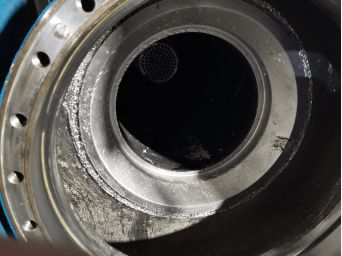The influence of material characteristics of flow-passing parts on cavitation in centrifugal pumps
The cavitation damage of the pump is mainly reflected in the damage to the material of the flow-passing parts. Therefore, the material properties of the flow-passing parts will also affect the cavitation of the centrifugal pump to a certain extent. Using materials with good cavitation resistance to make the flow-passing parts is an effective measure to reduce the impact of centrifugal pump cavitation.
(1) Material hardness: Taking the impeller made of AISI304 as an example, cavitation will cause work hardening of the impeller material and phase transformation to induce martensitic steel. This change will in turn prevent further cavitation of the material. The cavitation corrosion resistance of work hardening and phase transformation induced martensite steel mainly depends on the hardness of the impeller material.

(2) Work hardening and fatigue resistance: The higher the work hardening index of the material, the better the fatigue resistance, and the better the cavitation resistance of the material.
(3) Influence of crystal structure When other conditions are determined, the anti-cavitation rate is a function of the microstructure. In the cubic crystal system, because the metal with a body-centered cubic lattice has a high strain rate sensitivity, when the strain rate increases, it will cause rapid transgranular brittle fracture and cleavage fracture, and lead to the formation of pitting corrosion, resulting in greater Large abrasion rate. For a metal with a close-packed hexagonal lattice, when it is close to the ideal axial ratio and is in a cavitation environment, all six slip systems are activated and quickly transform into a stable FCC state, absorbing the work done by the cavitation stress and increasing the abrasion rate. decline. For metals with face-centered cubic lattice, there are many slip systems, and plastic flow will occur under high stress. Therefore, the gestation period is long and the abrasion rate is reduced. In short, during the cavitation process, the transformation from BCC to HCP or FCC to HCP will improve the cavitation resistance.
(4) The influence of grain size. The smaller the grain size of the metal material used in the impeller, the better the cavitation resistance. Because the smaller the grain size of the metal, fine grains increase the number of grain boundaries, hinder dislocation slip, increase the resistance to crack expansion, and extend the wear life.




